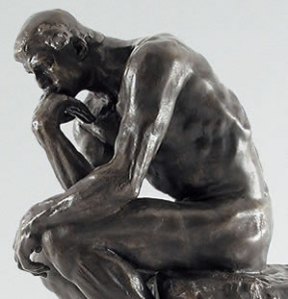People are filled with angst and confusion. There are a million things whirling around our heads at any given moment, overwhelming us.
Fear not. There is an insightful reason why humans are so overwhelmed all the time. It is because, whether we know it or not, we are rational beings. Until one realizes this, consistent frustration and confusion are unavoidable.
In fact, I am going to argue that we are not fundamentally emotional, social, spiritual, loving, hopeful, or with faith. If one tries to make these things fundamental, one is destined to live with omnipresent internal confusion, angst, and dissatisfaction. However, many of these “positive” adjectives can (and do, and should) come afterwards, but only after rationality. Sounds radical, right? Allow me to explain:
Emotional: There seems to be a viscous cycle. Mary meets Joe, falls in love, is certain of their destiny together, and gets her heart broken. Happens all the time, every day. Why? Wouldn’t it make sense for young people to exercise caution in the relationship department, after looking around and seeing the constant emotional turmoil of the endless heartbreaks of their peers? Indeed, many have argued that heartbreak is destined to happen, that it is our destiny to be caught up in a whirlwind of emotions. They continue: that is what makes us human, and we should embrace it.
This emotional reality applies not only to human relationships, but to every other area in which humans become emotional, which is a lengthy list. Football to food, intellectual ideas to recreational activities, nearly every facet of human existence seems to involve emotions. We’ll revisit this in a few paragraphs.
Social: The same argument applies when it comes to the social aspect of human nature. We desire so deeply to be social, it seems, that it must be a fundamental property of our existence. If this is truly the case, we are destined for distress. Don’t believe me? How much internal turmoil have you seen people go through in regards to their social status? How much of a young person’s life revolves around “fitting in”? How many cases of social desperation result in a completely destroyed self-image. If a human gets their worthiness for the acceptance of his peers, that is only a recipe for disaster.
But does it have to be? Does it have to be all the time? Before I answer that, another must be explained:
Faith: This topic includes both hope and so-called “spirituality”. Perhaps no topic is more controversial than this. It might have the biggest implications. How many people on this planet could you point to and say, “They have faith in the wrong thing” or, “Their hope is misplaced.”? Most of them? If it’s the case that two religions exist that are mutually exclusive, how can it be that (at the very least) one huge group of people are so ideologically wrong, on such fundamental beliefs as morality. The question, “How should humans interact with eachother?” could not have larger implications for everyday life. And yet, so many people have so many differing beliefs; they can’t all be right. More troubling, most of them must be wrong, if objective truth exists.

How much internal trouble exists within the minds of the faithful, or spiritual (nevermind the death and destruction caused by people who believed they were acting in the name of God)? I can speak personally, having been raised in a Christian household, the ideas of a religion to which I desperately tried clinging simply never gave me a deep satisfaction. I tried to make it work, to force it to work, but it didn’t. I now know why.
There is always doubt in the back of a spiritual person’s mind, whether they acknowledge it or not. Indeed, there is a reason for this. It can be resolved. It might not even require the abandonment of religious or spiritual belief (though it certainly might). When you ask someone of faith whether they are certain or not of their beliefs, most will say “Yes, I am absolutely certain they are true.” Firstly, it is not the case that they are genuinely certain; it categorically can not be (which I will explain later). Secondly, I want to focus your attention to the second half of that innocuous sentence: “that they are true.”
In fact, that’s a good segue.
Truth: In going back over these examples, there is a theme. A very important theme, which can perhaps reveal the core realities of human nature. I’ll give it away up front, then beat it over your head. The common theme is this: truth. Truth. Truth is what you’ll soon realize permeates every facet of our existence; there is nothing more central to the human being than the (nearly always unconscious) search for truth. And here’s the proof:
Emotion revisited.
Let’s revisit the example of Mary and Joe. After the heartbreak, Mary introspects. She might ask a curious question, “What went wrong?” What was the ultimate problem in that example? Truth, or lack thereof. She thought the love would last forever, and this belief was false. Would she have committed herself to Joe if she knew the truth that he would abandon her? No? What does this mean? If the existence of love is based solely on other factors (the truthfulness of whether he loves her back, the truthfulness of whether she trusts him, whether they will have kids, etc.), this makes truth take a dominate position over love. Indeed, we might look back at the situation and think, “If Joe had really loved Mary, there would be no trouble! The situation would have ended completely differently had this emotion been based on truth, not falsehood or deception.”
What about other emotional situations? What about that time Billy cried over spilled milk? Why do we think this is silly? Given normal circumstances (there was no psychopath threatening to kill Billy’s family if he spilled the milk), we would say this emotion is not justified. In fact, we would say it is proper to completely reject and throw out the emotions of shame, guilt, humiliation, anger, hate, fear, etc. over such a situation. Again, one who makes their emotions fundamental, irrespective of the justification for them, is asking for trouble.
Social behavior revisited.
Let’s apply this analysis to the kid who desperately tries to fit in, at great cost to his internal character. A nerd gets called a name by a jock/group of jocks. The kid internalizes this, and becomes depressed, or believes that he is inadequate, or has all kinds of negative thoughts about himself. Simple example.
What went wrong here? What is the problem? Is it with the nerd or the jocks? Perhaps both? I’d say it’s the same error, committed by both parties.
The reason both parties have behaved in such a way is because of the following belief, “It is important to have social acceptance from your peers.” The jock believes this, and that is why he has acted in a way which he believes will harm the nerd. The nerd knows this, and that is why he feels depressed at the fact that he was, indeed, rejected by some of his peers.
How to avoid this situation? Get rid of bullies, of course! No, not really. Cut down every single bully, or every single judgement by anyone, for that matter, at the knees. Instead of assuming that social acceptance matters, question that belief. Perhaps it is justified, perhaps not. I think everyone would agree, if social acceptance is important, it is certainly with caveats.
For example, let’s assume you believe in Islam. Will you feel dejected when the Christian rejects you? When he says you are in peril of the fires of Hell, why aren’t you paralyzed with fear? It is because you do not believe the opposing side’s assumptions are true. When I personally get rejected or mocked when discussing economics by those who have no economic understanding whatsoever, I don’t feel depressed. In fact, I wouldn’t have a reason to. If somebody laughs at you for believing 2 + 2 = 4, will you scurry away with a red face? No? Why? Truth is on your side.
If it is the case that the jock’s criticism of the nerd was unjustified (because he was wearing dorky shoes), perhaps it is not appropriate to internalize such criticism. If a group of people have incorrect assumptions, we should not care about their conclusions, for the same reason we should not care about the person who mocks your belief in mathematics.
If we seek acceptance, we should seek justified social acceptance, from those who are justified in accepting us. It is not the case that blind social acceptance is a good thing. So, we should not worry about being blindly rejected. If this is true, that matters.
Now the really important one: Faith.
Marty has high aspirations. He is a golfer, and is 20 shots behind the leader in a tournament. He has faith that God will help him win; all he needs is a hole-in-one on the next 7 holes. He hopes. Perhaps he prays.
Marty doesn’t get 7 hole-in-one’s, and his faith is shaken. His hopes were dashed, emotions wrecked. What went wrong?
It has to do something with truth. If it were the case that his beliefs were based on truth, let’s say he didn’t need to pull such an impossible feat at 7 hole-in-one’s, he wouldn’t have had an issue. If his faith was justified, he wouldn’t have an internal crisis. If his emotions were not fundamental, but were completely based on truth, he wouldn’t go through such devastating lows.
Marty also has a faith; he is a Christian. He understands that it is the duty of the faithful to put their faith before anything else, in front of rationality if need-be (we’re only limited creatures, after all, right?). He believes he will go up to heaven once he dies.
Let’s assume Islam is true. Marty will not go up to heaven, but will instead be judged by his many Western debaucheries. He will be divinely punished. Well, what went wrong? Yes, after much beating a dead horse, I will give you the same answer: it has to do with truth. Had Marty believed in Islam (what is true in this example), he would not have had such a problem.
But how could he have known?
Yes, all of that was a preface to this conclusion.
If it is the case that truth matters so much, is there a proper way to find out what it is? The popular belief is that truth is relative. What’s true for you might not be so for me. Don’t be fooled.
If it is the case that truth affects every single belief and emotion we have, or that it should, there is a way to live a justified life. It is via the use of reason. The absolute devotion to truth requires the highest standards of belief, only made justified, almost by definition, by reasons. Why believe X? Reasons first. Rationality first. If you truly seek to be correct, you can not accept any lower standard. This is in contrast to faith and emotions.
Ask yourself this question, “Do I make sense of something before I believe it, or do I believe something then try to make sense of it?”
If it is the case that you value truth, you must take the former position. The latter, belief without reason, is too easy to be wrong, even if it leads to a self-deceptive certainty of one’s belief. If I assert X is true, without reason, I can feel confident that X is true, regardless of if X is really true. Here’s an example:
I have faith that Muhammad was a prophet. Hence, I know Muhammad was a prophet. I can not be wrong, because the Koran is the word of God, and God doesn’t lie.
Please, substitute “Muhammad” for the spiritual figure of your choice.
Ah, but you might say, “I have reasons for my faith”. Be careful. You have implicitly acknowledged the supremacy of reason over faith. If it were the case that your reasons were lacking, would you change your belief, and are you sure? Are you really sure? If your conclusions are simply based on reasons, what is faith? Why do you add it to the equation? If you believe it is possible, let’s talk on facebook about how you mesh faith and reason, and how you know your faith is true. I am absolutely genuine in saying I am open to being convinced, whole-heartedly. But be warned, if you devote yourself to finding truth, you might find the justification for your faith shaken.
Now, it is perfectly understandable why people claim to have reasons for their faith, and it comes back to what was originally written: humans are rational beings. Of course you seek reasons for your beliefs. So many of the internal confusions and struggles that people have are due to the suppression of our rational faculty. If we want to be happy, we must to use our minds to discern right from wrong. However, you absolutely must acknowledge a hierarchy of knowledge. It is always truth first. Then come reasons. Then comes belief. Emotions and feelings might follow from justified beliefs, but that’s what we would expect, and we can feel fantastic about such emotions.
Never, ever put belief before reasons, if you are honestly seeking to find truth. Unjustified faith only enters into the equation if you can pretend to value feel-good-self-deception over what is true.



Pingback: Three a week: Reason | one free mind
Pingback: Three a week: God | one free mind
Pingback: Statistical Anomalies: are they from God?
Pingback: Why wear makeup? | one free mind
Amazing article, i totally agree about all the points you mentioned. That is the reason science is a less emotional thing than religion. And science mostly has the emotion of joy rather sadness. Truly awesome.
Pingback: Why you shouldn't have faith | one free mind
Pingback: Marriage | one free mind
Pingback: Three a week: Justification | one free mind
Pingback: The placebo effect | one free mind